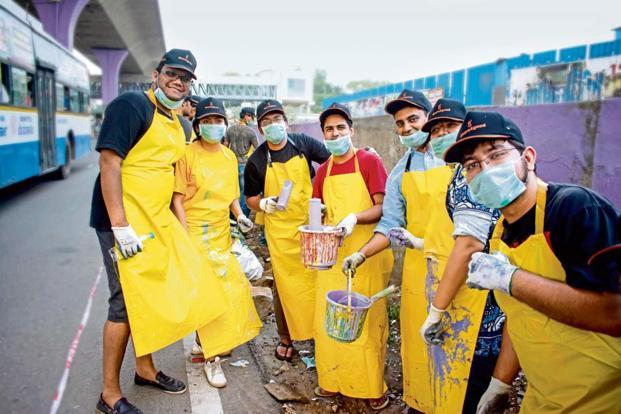On World Environment Day, we look at how employees are driving companies to become more planet-friendly
Goodera’s staff at a drive to clean the Nayandahalli flyover in Bengaluru.
For Mumbai resident Surmai Kaushik, 24, calling for action against climate change is not just a personal interest, but her life’s mission. In March, she embarked on an expedition to Antarctica with a group of global campaigners to raise awareness about climate change and ecological sustainability.
Kaushik’s trip was sponsored by her employer, Mahindra Susten, a solar solutions company in the Mahindra & Mahindra group. “They felt it would add value since sustainability is important for business,” she says.
Surmai Kaushik went to Antarctica to raise awareness about climate change.
The company spent Rs13 lakh on the CSR executive’s Antarctica expedition. “When I interacted with Surmai, I could immediately sense her passion to make the world a better place. We are committed to combatting climate change under our ‘rise for good’ philosophy. To send a young girl to the edge of the world to study this and learn from subject matter experts was a self-evident step in the right direction,” says Vivek Nayer, chief marketing officer and member of sustainability council, Mahindra & Mahindra.
Bengaluru-based Richa Bajpai, co-founder at Goodera, a CSR and sustainability management platform, says for companies like hers, which have a largely millennial workforce, just caring about the environment is not enough. Employees also want to contribute. “We help companies become more efficient in terms of their environment and social performances, and that is the core of the work we do. Internally, we also aim to practise that and try and adopt eco-friendly activities, like switching of lights when we are not in a conference room, doing double-side printing, etc., because it engages the employees,” she says, adding that along with some employees, she was part of a volunteering activity in April to clean the Nayandahalli flyover in Bengaluru. “It helped me reflect on how much difference a small group can make towards environment,” she says.
A sand sculpture by Sudarshan Pattnaik for World Environment Day. Photo: Priyanka Parashar/Mint
At the core of disruptive organizations is their millennial talent, who want to belong, be heard, learn and grow in their job, have varied experiences and make a difference, says Rajeev Dubey, a member of Mahindra & Mahindra’s group executive board. “They already comprise 50% of our workforce and that figure is only set to rise,” he says.
Research shows that millennials—or young adults born between the early 1980s and 2000s—are willing to work for a company that shows a “genuine commitment” to corporate social responsibility, the environment and sustainability. The study released last month by global consulting firm Deloitte revealed that about 38% of the 303 Indian millennials interviewed for the research believed that businesses should prioritize protection of environment as their core agenda, while 41% sought action towards other social causes.
Kaushik says millennials like herself, who are “intellectually conscious” and wish to do good and live with purpose, would want to be associated with a company whose vision aligns with their own. “Most companies these days are unable to make employees feel that they are contributing to the larger picture, and that’s why there is so much attrition,” she says.
According to S.V. Nathan, partner and chief talent officer, Deloitte India, companies are increasingly inculcating green practices to ensure that they keep up with the new generation’s thinking and reduce activities that harm the environment. “In the retail, FMCG, food and beverage industry, especially, you would see a lot of messaging around locally and ethically sourced raw materials, recycling products, donation of old products in exchange for discounts, no animal testing and organic ingredients used,” he says.
Nathan says the millennial population’s power to assert on such issues is likely to rise over time. “As such, change is imminent since the younger generation now looks at businesses to not just focus on profitability but on the positive social impact along with it. One of the ways to ensure a positive social impact is to make concerted efforts towards environmental sustainability and protection,” he says.
The need to incorporate eco-friendly practices is strongly felt in certain industries like the technology and hospitality sector. A consumer survey conducted in May by global hospitality company Hilton found that “social and environmental ethical considerations” were at the centre of their guests’ considerations while choosing a hotel, especially for those under 25. The survey found that 44% of such travellers actively sought information on a hotel’s environmental and social efforts before availing its services.
Experts say that if businesses fail to reflect that they are sincere about environmental and social sustainability, they risk alienating the millennial group, both as customers and employees. “Where workplace opportunities are offered, millennials are significantly more likely to ask if they can influence social equality, the environment, the behaviour of big businesses, and even the directions of their countries. The key point is that employers can provide them a sense of empowerment,” says Nathan.
Article Source: LiveMint



